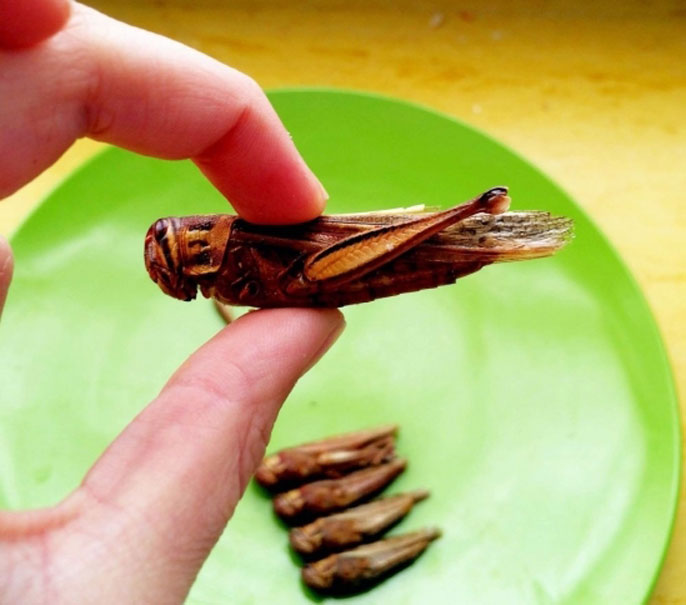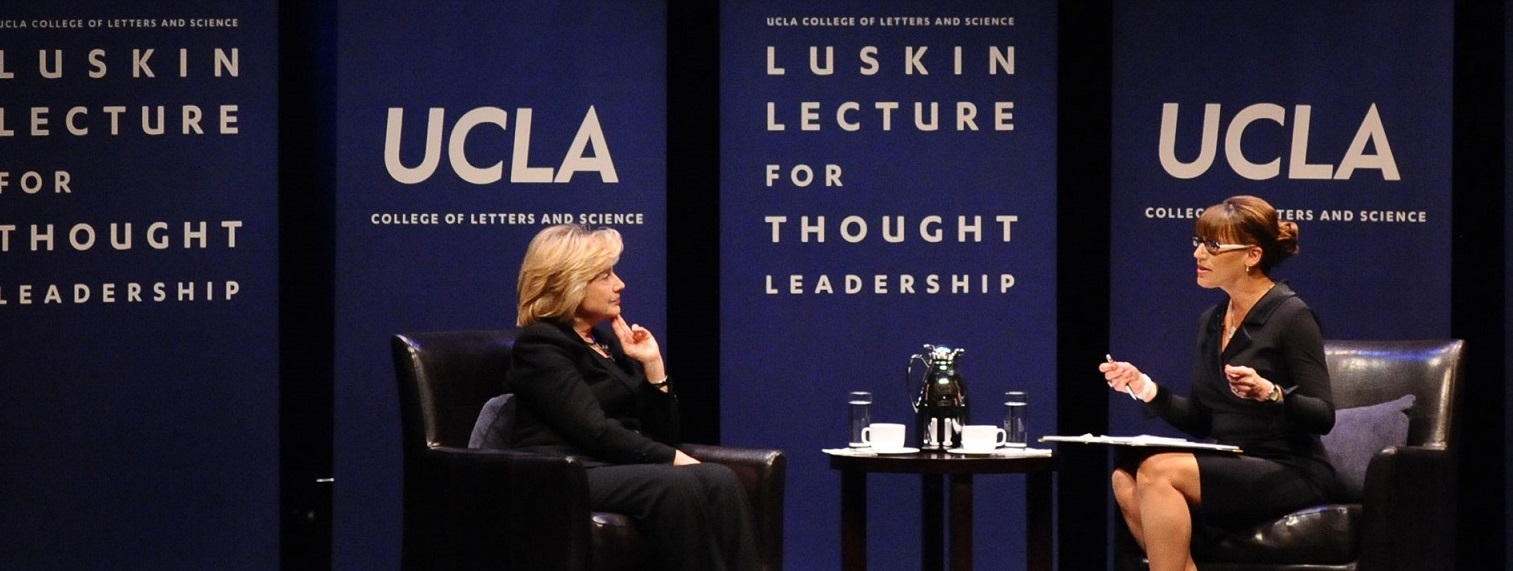You might not have known, but a lot of people think you should be eating insects. Their arguments are legion: Edible bugs are better for the environment and can help slow climate change, they can alleviate malnutrition and ease food insecurity. Also, they’re delicious.
你可能不知道,很多人认为你应该吃昆虫。他们的论据有很多:食用昆虫对环境更好,有助于减缓气候变化,它们可以缓解营养不良,缓解粮食不安全。除此之外,它们还很好吃。

“June beetles are fantastic,” said MacKenzie Wade, a doctoral candidate in anthropology at UC Santa Barbara. “They truly taste like bacon.”
加州大学圣塔芭芭拉分校(UC Santa Barbara)人类学博士候选人MacKenzie Wade说:“六月甲虫真是太神奇了。它们尝起来特别像培根。”
Wade, who farmed mealworms in her dorm room as an undergraduate at Kansas State University, is an unapologetic advocate for edible insects. Her interest in them, however, is far more than gustatory. Her research specializes in insects as food, and the cultural aversions to eating them.
Wade在堪萨斯州立大学(Kansas State University)读本科时,就在宿舍里饲养粉虱。她是昆虫可食用的坚定倡导者。然而,她对它们的兴趣远不止于味觉。她的研究重点是昆虫作为食物,以及人们对食用昆虫的文化厌恶。
That led her and Jeffrey Hoelle, an associate professor of anthropology and her graduate advisor, to do the first systematic review of research literature on edible insect production. “A review of edible insect industrialization: Scales of production and implications for sustainability,” in the journal Environmental Research Letters, challenges some of the assumptions about edible insects and their potential to combat climate change and inequality.
这让她和人类学副教授、她的研究生导师Jeffrey Hoelle第一次系统地回顾了有关昆虫可食用生产的研究文献。发表在《环境研究快报》(Environmental Research Letters)上的《食用昆虫工业化回顾:生产规模和对可持续性的影响》(A review of edible insect industrialization: scale of production and implications for sustainability)挑战了关于食用昆虫及其对抗气候变化和不平等的潜力的一些假设。
The researchers reviewed 66 articles from 2018, what they call “a watershed year in edible insect research.” They then analyzed several aspects of industrial insect farming, including microbiology, external production factors, product development, consumer acceptance, and the social and environmental dimensions of the industry.
研究人员回顾了2018年的66篇文章,他们称2018年是“昆虫可食用研究的分水岭”。然后,他们分析了工业化昆虫养殖的几个方面,包括微生物学、外部生产因素、产品开发、消费者接受度,以及该行业的社会和环境维度。
Wade, the lead author, said nearly every paper was premised on the sustainability of insect farming, especially compared with industrialized animal production.
主要作者Wade说,几乎每一篇论文都以昆虫养殖的可持续性为前提,尤其是与工业化的动物生产相比。
“But in the papers themselves,” she said, “there’s not a lot of grounded research being done on the actual sustainability impact of mass-rearing. That was one of the main disconnects that we saw.”
“但在论文中,”她说,“并没有很多关于大规模饲养的实际可持续性影响的研究。”这是我们看到的主要脱节之一。”
While edible insect farming offers a range of social and environmental benefits, Hoelle noted, scaling up production to support increased demand has the potential to undercut its potential for sustainability.
Hoelle指出,虽然食用昆虫养殖提供了一系列社会和环境效益,但扩大生产以支持不断增长的需求可能会削弱其可持续发展潜力。
“When we looked at the publications, they’re all about industrialization,” he said. “It’s likely that industrial insects would be less impactful than industrial scale livestock. But still, it’s kind of getting channeled into this way of doing things where efficiency, profit and all that becomes more important than the social and environmental aspects.”
“我们看到的这些出版物,它们都是关于工业化的,”他说。“工业化昆虫养殖的影响可能不如工业化牲畜养殖那么大。但是,它还是被引导到这种方式中,其效率、利润和所有这些都变得比社会和环境方面更重要。”
What’s clear, Wade said, is that edible insects have tremendous potential to feed a growing population in an increasingly damaged world. Some 2 billion people, mostly in the global South, already eat insects, many species of which contain as much protein as beef, more iron than spinach, as much vitamin B12 as salmon and all nine amino acids.
Wade说,可以肯定的是,在这个日益受到破坏的世界上,可食用昆虫有巨大的潜力来养活不断增长的人口。大约有20亿人(大部分在全球南部)已经开始食用昆虫,其中许多昆虫的蛋白质含量与牛肉相当,铁含量超过菠菜,维生素B12含量与鲑鱼相当,而且昆虫还含有所有氨基酸(共9种)。
But producers of edible insects face an uphill climb in the global North, where a deep-seated revulsion of the practice is endemic. Wade, who maintains an Instagram page on eating insects, called this aversion a cultural issue.
但在北半球,可食用昆虫的生产商面临着艰难的挑战,那里对食用昆虫的做法普遍存在着根深蒂固的反感。Wade在Instagram上有一个关于吃昆虫的页面,他称这种厌恶是一种文化问题。
Consider, she said, eating a hamburger, “the best you’ve ever had. And then all of a sudden you’re told that the burger is actually dog meat. That changes the taste of a burger, which I think is so interesting, because even though the taste actually hasn’t changed, you have this physical reaction to what you’ve just learned. So this knowledge that you’ve gained changes your reaction to this burger. It shows just how much culture and biology are linked.”
想想,她一边吃着汉堡,一边说,“这是你吃过的最好的汉堡。”然后突然你被告知这个汉堡实际上是狗肉。这改变了汉堡的味道,我认为这很有趣,因为即使味道实际上没有改变,你会对你刚刚了解到的东西产生物理反应。所以你新获得的知识会改变你对这个汉堡的反应。它显示了文化和生物学之间的联系。”
Getting people to eat insects might not be easy, but Wade is doing her part. With fellow bug enthusiast Aly Moore, she helped develop an educational program for the Girl Scouts that leads to a Cooking with Critters merit badge. She also does considerable public outreach and presentations.
让人们吃昆虫可能并不容易,但Wade尽了自己的一份力。她和另一位昆虫爱好者Aly Moore)一起,帮助Girl Scouts开发了一个教育项目,该项目包括“用昆虫烹饪”奖励徽章。她还做了大量的公众宣传和演讲。
And, of course, there was that period as an undergrad when she considered herself a mealworm farmer.
当然,在大学期间,她认为自己是一个面包虫农场主。
“I was definitely the coolest kid in the dorms, as you can imagine,” she said. “My roommate was so, so freaked out, but we had fun baking cookies with the mealworms, making all kinds of products. This was really when I was testing the waters of insect eating and I was pulling around all my friends to try things with me, and they got on board really fast. If you bring a bunch of mealworm cookies to a party and they get passed around, it starts a lot of conversations and people end up really loving them.”
“你可以想象,我绝对是宿舍里最酷的孩子,”她说。“我的室友吓坏了,但我们很开心地和粉虫一起烤饼干,做各种各样的东西。当时我正在试吃昆虫,我拉着我所有的朋友一起尝试,他们很快就上了船。如果你带了一堆粉虫饼干去参加聚会,大家会轮流分享,这会引发很多谈话,最后大家都很喜欢它们。”




